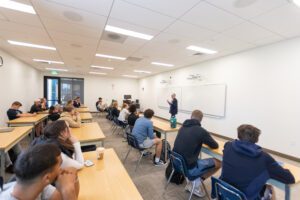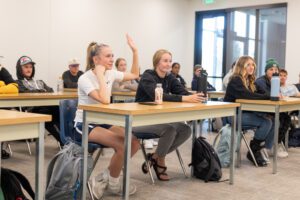With approximately 80% of University of Providence’s student population being student-athletes, the University is dedicated to implementing supportive systems and integrating educational strategies to improve the academic well-being of undergraduate students.
At the start of the academic year, the Student Engagement Office implemented the idea of “minds in the seats.” Vice President of Student Engagement and Athletics, Dr. Joel Bluml, initiated this mantra to encourage student-athletes to not only be invested in their athletic program, but to also be actively present in the classroom.
Doug Hashley, athletic director, mentioned he has been supportive of the idea and has been invested in increasing attendance in the classroom and be academically proactive and successful.
The 2022 – 2023 academic year built a strong culture of communication between the athletics and academics departments. As a result, student-athletes have been more dedicated to having minds in the seats, and it showed in their overall GPA. The athletics GPA in the Fall 2022 semester resulted in a 3.12 GPA, the highest it has ever been as a collective department.
“I think we are both now just seeing the results of the relationship between the coaches and professors. The students are definitely getting the value out of that, because they know we are talking and they know we are all on the same page,” said Hashley.
The athletics department has upheld their commitment to improving student-athlete academic success, with coaches striving to meet with faculty and get a comprehensive outlook of courses’ curriculum and objectives. This communication strategy and relationship building allowed coaches to be on par with academic criteria.
“I’ve always believed that as a student-athlete, you’re a student first and you’re an athlete second,” said Soccer Head Coach, Will Hander.

Coaches, such as Hander, are invested in ensuring students have a plan B in the event that an athletic career is not an option. Coaches want their student-athletes to understand that playing a collegiate sport is one of the many opportunities they encounter in college, and there are other external opportunities and challenges that can affect their four years.
“For me, it’s really just making sure that my athletes understand that there is an emphasis on education. You never know what you are going to learn and there is nothing wrong with the quest of knowledge and to find that quest and to keep going,” said Hander.
In addition to athletics connecting with faculty, faculty have also found ways to be supportive of student-athletes outside of the classroom. Professors attend athletic events and incorporate students’ sports and lingo in the coursework, allowing them to better relate and absorb course material.
Dr. Deanna Koepke, sociology professor, compared the reciprocal relationship between academics and athletics as the notorious carrot and the stick metaphor.
“There is the stick aspect of it where if they don’t pass the class they can’t play the game, but the carrot aspect is that you are learning tools for the rest of your life no matter what you do, and they work hand in hand,” said Koepke.
Dr. Koepke also reinstates the importance of connecting with student-athletes and understanding their athletic program to better connect with other aspects of their life.
“We see students as whole people. They are not just people in seats in the classroom. At least a lot of us recognize how important athletics is to them and every chance I get I will relate an example out of athletics. Just being able to tap into what is interesting to them is a way that we show that we care about the whole person. That is what we say – We are here to develop the whole person. That’s another way that I think we do that,” said Koepke.
As Dr. Koepke stated and as part of the University’s mission, the UP community evidently demonstrates their dedication to cultivating students in all areas of their life, which is shown in the partnership between the athletic and academic departments. Both departments are excited to continue developing their partnership, and they are looking forward to having minds in the seats in the upcoming year.
